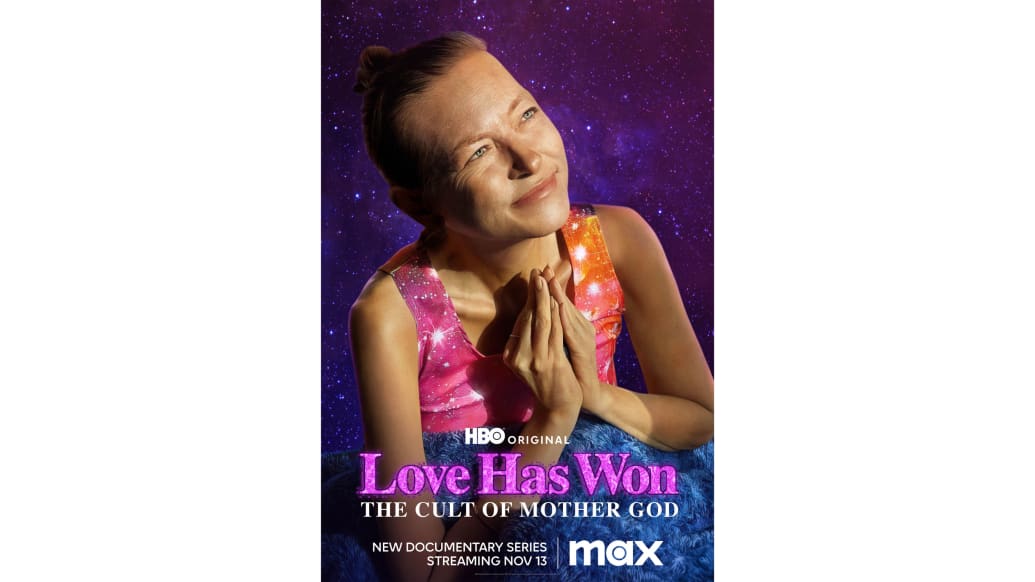Drugs, QAnon, and Mummified Corpses: This Cult Doc Has Everything
Even by cult standards, Love Has Won was uniquely nutty, its gospel almost as laughable as its adherents were devoted. Founded by Amy Carlson, a Kansas native who convinced herself and others that she was a holy being known as Mother God who was destined to save mankind by assuming its sins, it was a ragtag group of misfits and outcasts whose every waking second was dedicated to making sure their leader was happy. In this case, that involved keeping her stocked up on booze, weed, and psychedelics, all of which were viewed as her “medicine” and facilitated her conversations with “The Galactics,” a collection of higher-plane gurus who advised Amy on the best means of “waking up” humanity and “ascending” to the heavens via their starship.
The leader of the Galactics? None other than Hollywood legend Robin Williams, with whom Amy and her disciples routinely chatted.
Executive produced by Josh and Benny Safdie, the three-part Love Has Won: The Cult of Mother God (Nov. 13, HBO) is like the cartoon version of a typical cult docuseries, not because of its form—director Hannah Olson sharply and compellingly relays her tale—but because its particulars are so over the top. This is true from the get-go, as the proceedings commence with body-camera footage of police officers arriving on April 29, 2021, at the Colorado “mission house” of Amy and her Love Has Won acolytes. The house was a rundown shack decorated with Christmas lights, New Age-y drawings, and paintings, rainbow colors, and stuffed animals. Inside, what they discovered was the mummified corpse of Amy, who was wrapped up in a sleeping bag just as she had been while being transported across multiple state lines, post-death, from Oregon, where she’d passed away in a hotel room following a prior stint in Hawaii.
Amy’s body was in the residence because she’d convinced her flock that it was her destiny to depart Earth courtesy of the Galactics, and these loyal men and women were waiting for this spectacular phenomenon to take place. They were also convinced that, due to her three hearts (?!) and the fact that she was supposedly still radiating electric currents (?!), she was only dead by the standards of the “3D world,” their moniker for the superficial reality they’d identified as a Matrix-style façade. These notions were held by all and vigorously promoted by Amy’s partner Jason, who had joined their circle after years of petty crimes and homelessness. Jason was known as Father God—a supporting position that had previously been held by a few prior lovers, beginning with aged Amerith White Eagle (whose guidance convinced Amy to move to Colorado in the first place) and then young Andrew (who bailed before things got too hairy) and John (who stuck around and assumed the role of “Multiverse Father”).
Amy used the internet to spread her message, which comprised hippie-dippie nonsense about being one with the universe; various 9/11, QAnon, and pro-Trump and Hitler conspiracy theories; and amorphous biblical-via-sci-fi dogma. She did this while perpetually stoned, drunk, and tripping balls, since non-stop partying was central to her ethos. All of this attracted disparate men and women who assumed new names and pledged their allegiance to their hallowed Mother, tending to her every need and pushing her philosophy on various online channels. They additionally peddled her spiritual classes and cheap goods, and asked for donations, in order to keep this ragamuffin operation afloat—a job that primarily fell to Amy’s long-time associate “Archangel Michael,” who would eventually prove to be very interested in their bank account.
Amy’s downfall was brought about by a combination of endless substance abuse and habitual ingestion of colloidal silver, the latter of which turned her literally blue. As Jason and followers Hope, Aurora, El Moyra, Little Buddha, Erin, and John explain in Love Has Won: The Cult of Mother God, this alarming condition—as well as her sore-covered skin and scrawny frame—were symptoms not of a medical problem, but of Mother’s godly sin-shouldering work. Olson’s docuseries benefits from the candid participation of these true believers, whose commentary exposes the depth and breadth of their shared delusion. All of them come across as severely damaged people desperate for escape, a good time, and solutions to their dissatisfactions and problems, as well as a bit of kindness—on multiple occasions, speakers recount how the simple act of Amy saying “You’re brilliant” convinced them to trust in her divinity.

Buoyed by these interviews, as well as copious videos shot by Amy and her brood before and after her death, Love Has Won: The Cult of Mother God offers an unvarnished peek inside this insular community, demonstrating people’s stunning capacity for concocting and embracing ridiculous ideas as a way of coping with unhappiness and trauma. Through the participation of Amy’s mom Linda and sister Tara, Olson details the cult leader’s rocky childhood with an abusive stepmother, weight and body image issues, lousy and violent boyfriends, and the ensuing displeasure—as a wife and mother to multiple children—that drove her to seek solace in a wacko fantasy involving regular conferences with Robin Williams and the rest of the Galactics crew (Michael Jackson, Gene Wilder, Christopher Reeve, Tupac, Kenny Rogers, John Lennon, etc.).
Love Has Won: The Cult of Mother God is chock-full of insane pronouncements about “ego energy,” Amy’s “etheric meetings” with Robin Williams, her standing as “literally like the resurrection of Jesus,” and Amy and Jason’s status as “twin flames”—because, apparently, always online Amy was borrowing concepts from other loony cultists. Director Olson doesn’t have to strain to condemn or ridicule because the material at hand does the work for her. The sight of Love Has Won folks sitting around watching Mrs. Doubtfire, for instance, encapsulates both the humorous absurdity and pitiful sadness of this entire affair, which pinpoints loneliness and suffering as prime motivators for cults’ creation and success.
At the same time, it serves as a stark “Say No to Drugs” cautionary tale about excessive use of hallucinogens and alcohol, whose brain-addling effects helped facilitate a descent into madness that no sober, stable mind would ever accept.
This article has been archived for your research. The original version from The Daily Beast can be found here.


